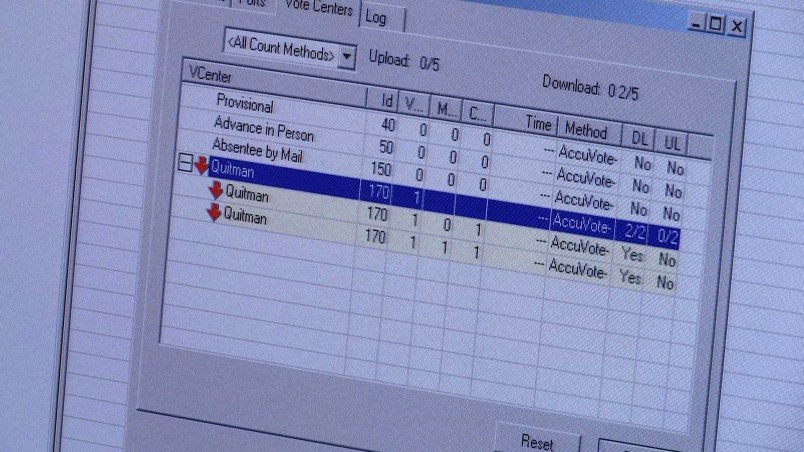(AP) — The Georgia attorney general’s office will no longer represent state election officials in an elections integrity lawsuit in which a crucial computer server was quietly wiped clean three days after the suit was filed, The Associated Press has learned.
The lawsuit aims to force Georgia to retire its antiquated and heavily criticized touchscreen election technology, which does not provide an auditable paper trail.
The server in question was a statewide staging location for key election-related data. It made national headlines in June after a security expert disclosed a gaping security hole that wasn’t fixed for six months after he first reported it to election authorities. Personal data was exposed for Georgia’s 6.7 million voters as were passwords used by county officials to access files.
The assistant state attorney general handling the case, Cristina Correia, notified the court and participating attorneys Wednesday that her office was withdrawing from the case, according to an email obtained by the AP.
Spokeswoman Katelyn McCreary offered no explanation and said she couldn’t comment “on pending matters.”
Correia’s email said “multiple counsel” are being appointed to represent Secretary of State Brian Kemp — the main defendant — and the other defendants. It does not say whether the state would pay those lawyers. Both Kemp and state Attorney General Chris Carr are Republicans.
The server’s data was destroyed July 7 by technicians at the Center for Elections Systems at Kennesaw State University, which runs the state’s election system, Correia had previously informed attorneys in the case.
The erased hard drives are central to the lawsuit because they could have revealed whether Georgia’s most recent elections were compromised by hackers. Russian interference in U.S. politics, including attempts to penetrate voting systems, has been an acute national preoccupation since last year.
It’s not clear who ordered the server’s data irretrievably erased.
Kemp, who is running for governor in 2018, has denied ordering the data destruction or knowing about it in advance. His office’s general counsel issued a two-page report on Monday claiming Kennesaw State officials followed “standard IT practices” in wiping the server that “were not undertaken to delete evidence.” In its initial statement on the server wiping on Oct. 26, Kemp’s office called KSU’s wiping of the server reckless, inexcusable and inept.
The report says “current indications are” that the FBI retains an image of the server that it made in March when it investigated the security hole. The FBI has not responded to AP inquiries on whether it still has that image or has performed a forensic examination to determine whether data on the server might have been altered by hackers.
Executive Director Marilyn Marks of the Coalition for Good Governance, a plaintiff in the case, called the attorney general’s office’s withdrawal from the legal defense shocking but not unexpected.
She accused Kemp of hiding the facts of the case — perhaps even from the state attorney general’s office.
“There have been multiple conflicting stories of how and when the evidence on the servers was destroyed,” she said.







The firm, V. Putin Associates of Moscow, will be taking over representation.
We have an election on some constitutional admenments in TX. Early voted Sat. I was surprised that our electronic machines were gone and we used paper ballots.
Any help discovering the legal basis for the withdrawal? e.g. conflict of interest.
_The lawsuit aims to force Georgia to retire its antiquated and heavily criticized touchscreen election technology, which does not provide an auditable paper trail.
The attorney general withdrew from supporting the election officials. How could he defend when the record was wiped?
Fuck that. She should be heading a criminal investigation into these acts. The withdrawal as counsel, if that’s all she does, is nothing but window dressing.